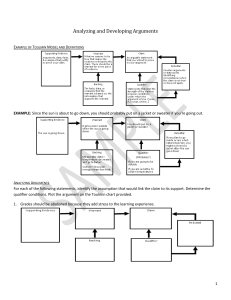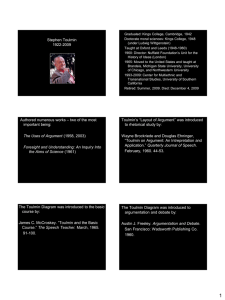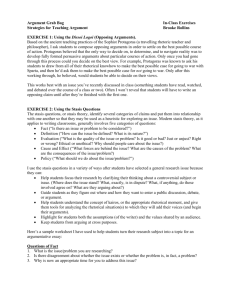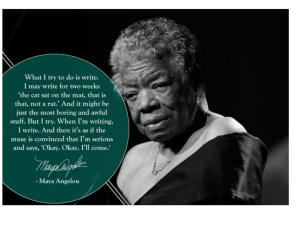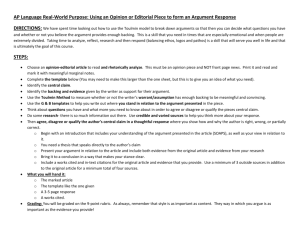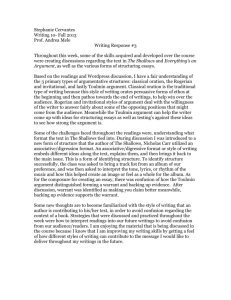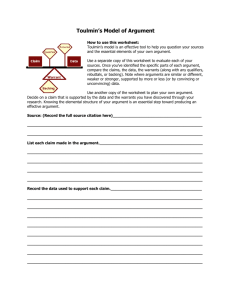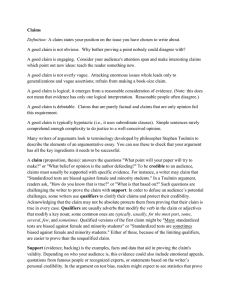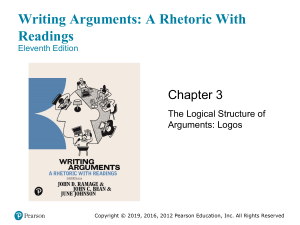of analyzing arguments
advertisement
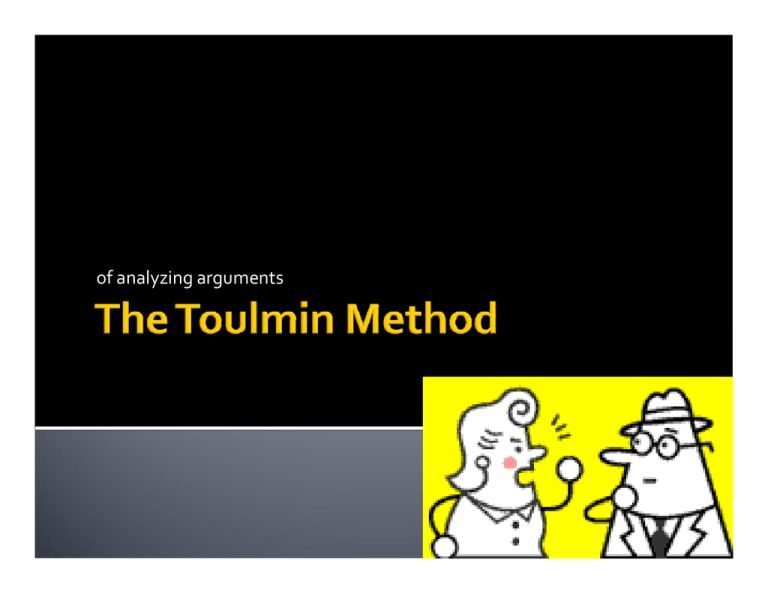
of analyzing arguments Toulmin wanted to devise a way to judge arguments. He wanted to find an unbiased way to judge whether an argument was “good” or “bad”. He did this by asking a series of questions of the argument. The more “yes” answers the argument provided, the better it was. A claim answers the question “what should we do?” A surprisingly large number of arguments don’t have claims. “The President is dumb” “Our taxes are too high” or, “The war is immoral” are all examples of arguments without claims. Qualifiers: Little words like “if” “some,” “many” “usually” that tend to make the claim more palatable to people who might otherwise oppose it Exceptions: Similar to qualifiers, always use the word “except” “ . . . except in cases of rape, incest or danger to the mother’s help.” Reasons answer the question “WHY should we do this?” Multiple reasons (at least three, no more than five) Relevant? Effective? A relevant reason is one that will work. That is, if I assert that we should start a mandatory study hour here at Gordon and one of my reasons is that it will raise GPAs, to ask if the reason is relative is to ask –will that, in fact, happen? Are GPAs low because of lack of studying? Or is there some other reason? (Poor test taking skills, for example) An “effective” reason, to Toulmin, is one that reflects society’s values. For example, if I reason that cheap day care is a great idea because more women will be able to work, that’s only an effective reason if the society values women’s labor. If I’m trying to argue to a strongly patriarchal society, for example, that might not be an effective reason as they don’t want women to work. A “Warrant” that is the reason WHY this expected outcome is good for society. (Don’t overlook this!) Reasons need to be BOTH relevant and effective. If they’re not BOTH, Toulmin says….. trash ‘em! Evidence. The facts, figures, quotations that support your reasons (evidence is the stuff that comes from the library). Sufficient? Credible? Accurate? This simply means is the pile of evidence presented large enough to convince a reasonable person? For example, if you wanted to argue people who drink Diet Coke get good grades in College Algebra, you’d need more than two examples to prove your point. This question asks who’s doing the talking? What is their agenda? Double check facts, figures, quotations, and spellings. If the evidence’s author makes mistakes with that stuff, he or she probably makes mistakes with bigger issues as well. Does the evidence gibe with other evidence on the issue? If not, why not? What are the best reasons not to go forward with the claim? People on the other side are not evil; what’s their reasoning? What these objections, valid though they are, are not seeing or are not taking into account. Evidence in the refutation (or rebuttal) is held to the same standard as evidence anywhere else; that is, it needs to be sufficient, credible, and accurate. Toulmin’s method asks us to look for Claim (with qualifiers and exceptions) Reasons (that are both relevant and effective) Evidence (that is sufficient, credible, and accurate) Objections Refutations An argument that does everything that Toulmin’s method asks of it is an “effective” (or good) argument –whether or not you happen to agree with it.
